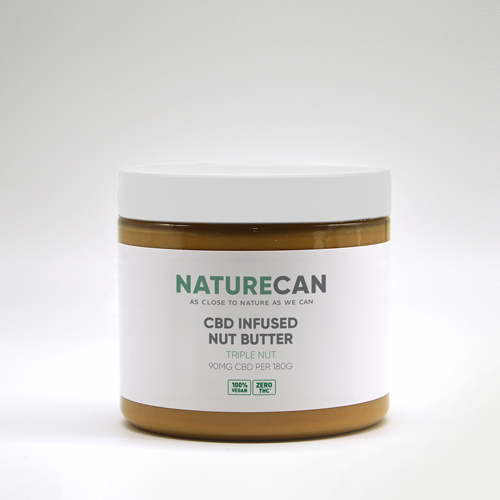DOES CBD work for ANXIETY?
Summary points:
- Anxiety can affect how we think and feel, and negatively impact our quality of life.
- CBD may contribute to reduced levels of anxiety and target many of the problems potentially causing it.
- Neuroimaging shows that CBD interacts with the same areas of our brain that are most affected by anxiety.
The past year has taken a toll on everyone. Being socially isolated, having more (or less) work on our hands, and feeling uncertain about the future have all been a threat to our physical and mental health. Moreover, now that things are starting to open up again, some may feel anxious about navigating the “outside world”.
The Mental Health Foundation has been conducting mental health surveys on adults in the UK. In 2019, a survey showed 5.9% of the UK population reporting symptoms of anxiety. In July 2021, this figure rose to 36%. With more people looking for ways to improve their mental health, CBD is becoming an increasingly popular choice for people with anxiety.
What is anxiety?
According to the Oxford Dictionary, anxiety is “the state of feeling nervous or worried that something bad is going to happen.”
Anxiety is different from stress. While a situation may cause stress, anxiety is associated with persistent worries that remain even in the absence of a stressor.
Although anxiety is an emotion, it also has several physical symptoms, such as dizziness, nausea, and experiencing shortness of breath.

How anxiety affects the brain
The human body has evolved in many ways to ensure its survival, such as the “fight-or-flight” (sympathetic) response. This is one of the two divisions of the autonomic nervous system and is responsible for raising our heart rate, blood pressure, and breathing to prepare for sudden activity.
Anxiety keeps the body in a sympathetic state for prolonged periods, which can become detrimental to our health. Here is how it affects us:
1. A constant release of stress hormones
When in a state of anxiety, the brain floods the central nervous system with the stress hormones adrenaline and cortisol. They help decrease our reaction time by sharpening the senses and improving our reflexes. Usually, the parasympathetic response kicks in once the threat is gone, and hormone levels return to their baseline.
However, there may not be a specific trigger when suffering from anxiety, and the brain continues to signal for these hormones. When this happens over longer periods, anxiety levels may gradually increase.
2. Hypervigilance
Anxiety causes the amygdala to become more prominent. The amygdala is the part of the brain associated with mood and emotion. It’s on the constant lookout for potential threats and can trigger our fight-or-flight response.
In the brains of people suffering from chronic anxiety, the amygdala is hypersensitive and much larger than usual.
An overactive amygdala sends out false alarms so that the brain senses danger in non-threatening situations.
3. The brain responds irrationally
When the amygdala sends alerts to the brain, our prefrontal cortex usually kicks in to form a logical response. It helps the brain process all information available and solve problems logically.
Over time, anxiety can weaken the connection between the amygdala and prefrontal cortex.
When the amygdala sends out alerts, the problem-solving part of our brain cannot react appropriately, and we think and act irrationally.
Ways to treat anxiety
As doctors often can’t identify the specific problem causing anxiety, they must approach the issue from multiple angles.
Sleep
Sleep is crucial to our health, especially our mental health. While we sleep, our brain processes all emotional information that shapes our memory and affects our mood. Sleep and anxiety can influence each other negatively so getting enough sleep, typically between seven to nine hours for adults, is one of the most important steps in tackling anxiety.
Diet
Since our brain primarily runs on glucose, there's a lot of evidence suggesting a close relationship between mood and blood sugar levels. A diet high in refined carbs and added sugars can cause sudden drops in blood sugar levels, resulting in a depressed mood and feelings of worry and anxiety. Eating more foods with a low glycemic index, such as protein and fibre, is a great way to stabilise blood sugar levels.
Grounding
Grounding techniques can refocus the mind on the present and remove the body from a state of panic. One popular method is the “Box Breathing” technique, which involves breathing in deeply for four seconds, holding for four, breathing out through the mouth for four seconds, holding for four, and repeating. This technique calms the nervous system and brings breathing back to a steady rhythm to avoid hyperventilation.
What is CBD?
CBD is one of many active compounds in the cannabis plant. It has no intoxicating effects but offers numerous potential benefits to both our physical and mental health. You can find out more in our blog post “What is CBD?”
CBD influences the endocannabinoid system (or ECS), one of the most important systems in the body. The ECS regulates several vital body functions, such as sleep, mood, appetite, memory, pain, and immune function, through a system of neurotransmitters and receptors.
CBD is a cannabinoid that can act as a transmitter and interact with receptors attached to various cells throughout the body. The cells respond by acting on the information they receive to adapt to any environmental changes.

Various factors can weaken our ECS and cause these functions to become imbalanced. As a result, you may experience problems in areas regulated by the ECS. CBD supports the ECS and helps it maintain balance more efficiently by supporting the body’s natural rhythm.
Can CBD help to reduce anxiety?
Anxiety can be caused by a range of underlying issues, including medical conditions and unhealthy habits, so it's important to look after one’s health and lead an active lifestyle. CBD may help to do just that.
Studies have found that CBD use is correlated with lower anxiety levels, sometimes as a by-product of contributing to reduced pain and stress and better quality sleep. But research is finding that CBD directly affects anxiety as well.
A preliminary report on the effects of CBD oil on anxiety investigated how CBD interacts with the underlying brain mechanisms behind social anxiety disorder. Patients were given either 400mg CBD or a placebo in the study, and those administered CBD oil reported significantly lower anxiety levels than those given the placebo. The study also used neuroimaging to observe the effects of CBD on the brain and found that it mainly affects activity in limbic and paralimbic brain areas, which is where the amygdala is located.
Another 2014 study found that CBD may cause our brain to respond to serotonin differently by producing anti-anxiety effects. More recent research has also confirmed that CBD has anti-stress effects, which may contribute to reduced anxiety.
Please note that CBD is a dietary supplement that shouldn’t replace medications and is best used with other support methods. Once your sleeping habits, diet, and stress levels are under control, you might consider adding CBD to your routine to support the endocannabinoid system further.
Ways to take CBD oil
There are many ways you can take CBD oil, depending on your routine and preference. We explain this in more detail in our blog post “How to take CBD oil?”. We’ve also made a CBD Dosage Calculator to help you find your ideal CBD oil dosage.
Different types of CBD products
Sublingual CBD
Generally speaking, sublingual CBD, such as CBD oil, has the fastest onset of effects as it’s absorbed directly into your bloodstream through the capillaries under your tongue.
The best way to take CBD oil is to put a few drops, depending on your dosage, under your tongue and hold them there for about a minute before swallowing.
CBD oil takes approximately 15 minutes to half an hour to take effect and lasts for four to six hours. It’s best suited for using multiple times throughout the day, before any stressful events, or just to help keep balance in your day-to-day.


Ingestible CBD
Ingested CBD, such as CBD capsules and CBD snacks, gets broken down by the stomach and liver before it can be absorbed into your bloodstream. As a result, this method takes longer to have an effect, but these effects will also last longer.
Ingested CBD takes 30 minutes to an hour to take effect and will last for six to eight hours. This consumption method allows you to take CBD in the morning to improve your general wellbeing throughout the day or before bed for improved sleep.
Inhalable CBD
When vaping CBD, you’ll notice the effects almost immediately as the CBD is absorbed into your lung’s thin mucus membrane, where it enters your bloodstream.
Since this consumption method allows CBD to travel through your heart and the rest of your body before passing your liver, it also has the highest bioavailability — meaning a greater portion of the consumed amount of CBD makes it into your circulation.
The effects of inhaled CBD only last one to three hours, making it a great option for relieving immediate symptoms.

Different CBD oil products and their average dosage

CBD Oil
6mg CBD per drop of 15% CBD oil

CBD Oil Capsules
10mg CBD per capsule

CBD Gummies
10mg CBD per gummy

CBD Cookies
25mg CBD per cookie

CBD Triple Nut Butter
7.5mg CBD per 15g serving
Does CBD have side effects?
CBD is safe to consume and generally well-tolerated. If you take the right amount of CBD oil, it's unlikely you'll experience any side effects. It's important to note that CBD may interact with other medications and negatively impact their effects, so always consult with a doctor before combining CBD with other drugs.
Potential CBD side effects:
- Dry mouth
- Reduced blood pressure
- Diarrhoea
- Fatigue
- Reduced appetite
The side effects of CBD are often caused by poor quality in the products themselves. Harmful ingredients such as pesticides and heavy metals are common contaminants, but it may also result from a poor growing environment, as hemp tends to absorb any chemicals from its soil.
Always check for a Certificate of Analysis before buying any CBD products to see a list of all contained ingredients. We make sure to test all Naturecan products for non-detectable levels of THC and to ensure that no harmful substances end up in our final product. You can read about our rigorous six-step testing process here.
Takeaway
Anxiety can make everyday life much more complicated than it already is. It can take a toll on your work performance, important relationships, and emotional wellbeing. Oftentimes, the best way to relieve anxiety is by living a more balanced life.
CBD may contribute to reduced anxiety by supporting our endocannabinoid system, which is responsible for regulating important body functions such as our stress levels, mood, and sleep. Researchers have also found that CBD interacts with the areas of our brain most affected by anxiety. If you suffer from anxiety and are considering using CBD oil, be sure to check for third-party lab results and consult with your doctor if symptoms of anxiety persist.
References
- https://www.health.harvard.edu/blog/cannabidiol-cbd-what-we-know-and-what-we-dont-2018082414476
- https://journals.sagepub.com/doi/10.1177/0269881110379283
- https://www.anxietyuk.org.uk/wp-content/uploads/2019/08/Key-Facts-and-Figures-2019.pdf
- https://www.mentalhealth.org.uk/research-and-policies/wave-11-16th-june-%E2%80%93-2nd-july-2021
- https://www.oxfordlearnersdictionaries.com/definition/american_english/anxiety
- https://www.nhs.uk/mental-health/conditions/generalised-anxiety-disorder/symptoms/
- https://www.ncbi.nlm.nih.gov/books/NBK542195/
- https://www.webmd.com/a-to-z-guides/what-is-cortisol
- https://www.intechopen.com/chapters/55211
- https://www.healthline.com/health/stress/amygdala-hijack#symptoms
- https://www.sleepfoundation.org/mental-health/anxiety-and-sleep
- https://www.nhs.uk/live-well/sleep-and-tiredness/how-to-get-to-sleep/
- https://sph.umich.edu/pursuit/2019posts/mood-blood-sugar-kujawski.html
- https://www.ncbi.nlm.nih.gov/pmc/articles/PMC424197/
- https://www.webmd.com/balance/what-is-box-breathing
- https://www.verywellhealth.com/the-limbic-system-2488579
- https://pubmed.ncbi.nlm.nih.gov/24923339/
- https://www.ncbi.nlm.nih.gov/pmc/articles/PMC6161644/
Disclaimer: There is currently insufficient evidence to support the use of CBD in the condition(s) mentioned above and this text by no means reflects recommended uses. Always seek the advice of your healthcare professional if you are taking prescribed medication or are thinking of using CBD for your condition.




